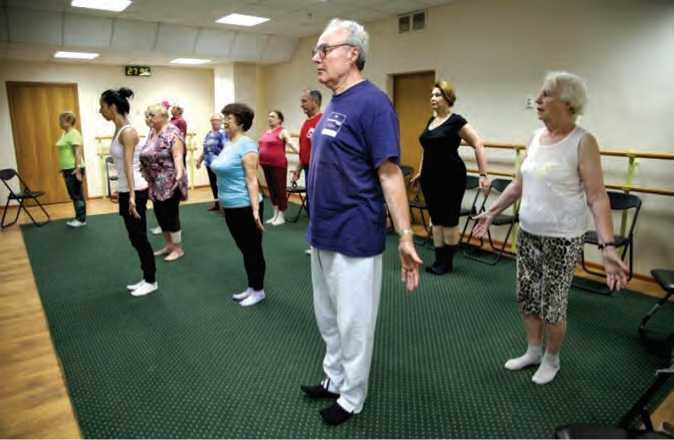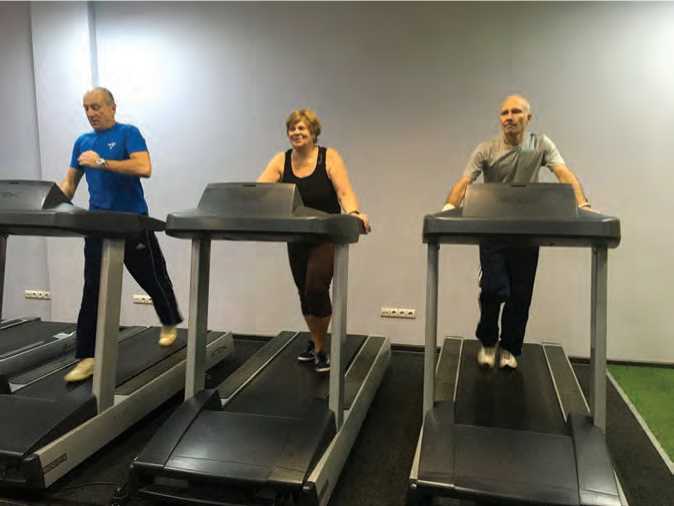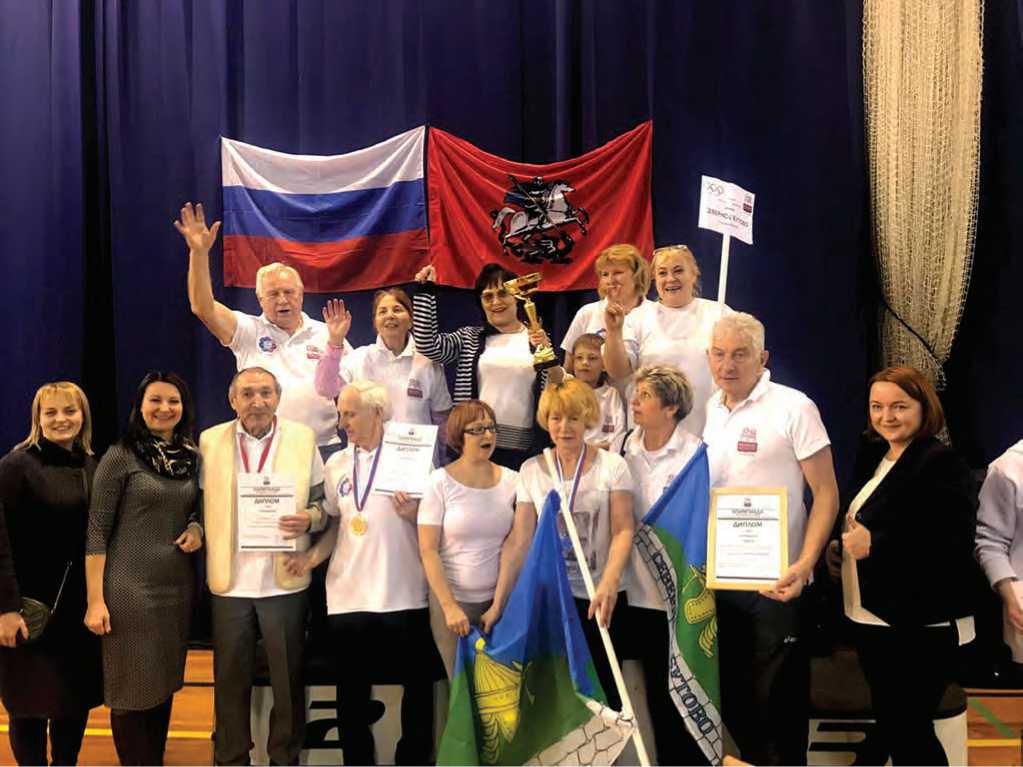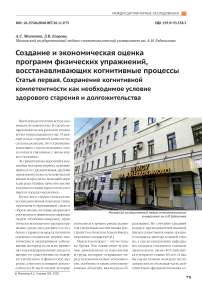Создание и экономическая оценка программ физических упражнений, восстанавливающих когнитивные процессы. Статья первая. Сохранение когнитивной компетентности как необходимое условие здорового старения и долгожительства
Автор: Молчанов Александр Сергеевич, Егорова Лариса Владимировна
Журнал: Высшее образование сегодня @hetoday
Рубрика: Междисциплинарные исследования
Статья в выпуске: 11, 2020 года.
Бесплатный доступ
Рассматриваются проблемы сохранения когнитивной компетентности как предпосылки повышения продолжительности жизни. Отмечается, что развить, восстановить когнитивные процессы можно в любом возрасте. Приведены данные, согласно которым систематическая физическая активность стимулирует нейротрофические процессы в головном мозге и приводит к структурным и функциональным изменениям, активизирующим интеллектуальную деятельность. В связи с этим ставится задача создания доступных широким слоям населения физических тренингов и индивидуальных программ физических упражнений. Отмечается, что для разработки и реализации психофизиологических программ, направленных на сохранение и восстановление когнитивных процессов лиц старших возрастов, нужна большая ясность в понимании механизмов воздействия на интеллект физической активности, а также экономическая оценка реализации этих программ на региональном и федеральном уровнях.
Когнитивная компетентность, интеллектуальная деятельность, возрастные когнитивные нарушения, физические упражнения, групповые и персонифицированные программы тренингов, направленных на сохранение когнитивных процессов, экономические затраты
Короткий адрес: https://sciup.org/148321481
IDR: 148321481 | УДК: 159.9+33.338.5 | DOI: 10.25586/RNU.HET.20.11.P.75
Текст научной статьи Создание и экономическая оценка программ физических упражнений, восстанавливающих когнитивные процессы. Статья первая. Сохранение когнитивной компетентности как необходимое условие здорового старения и долгожительства
крытий совершена учеными старших возрастов.
Следовательно, продление жизни, увеличение ее продолжитель- экономический смысл. Особенно тогда, когда проблема долголетия будет решаться в тесной взаимосвязи с сохранением когнитивной компетентности, которая, в свою очередь, является катализатором физического здоровья.
Факторы, которые снижают риск стагнации интеллектуальных возможностей человека, современной науке известны. У людей, которые в молодости вели активный образ жизни хотя бы средней интенсивности, в старости на 39% реже возникает синдром умеренных когнитивных расстройств. Умеренная по интенсивности, но систематическая физическая активность снижает риск возникновения когнитивных нарушений в пожилом возрасте на 35–38% [20, с. 114].
Результаты функциональной магнитно-резонансной томографии указывают на постепенное снижение объема головного мозга и увеличение объема мозговых желудочков после 50 лет. Величина гиппокампа, играющего важную роль в механизмах памяти, ежегодно уменьшается на 0,86%, и этот процесс ускоряется после 50 лет. Наблюдаются также изменения объема ряда областей коры головного мозга, мозжечка [18, с. 23–24]. После 70 лет этот процесс развивается особенно стремительно. Наиболее отчетливо он наблюдается у людей, страдающих гипертонией и диабетом второго типа.
Нужна целенаправленная и систематическая работа по формированию у населения эффективных адаптационных механизмов к происходящим и грядущим изменениям, а также по развитию когнитивных возможностей у людей всех возрастных групп. Для этого уже существующие развивающие и коррекционные методы могут быть адаптированы и с успехом применяться для обучения людей, относящихся к средней и старшей возрастным группам.
Продуктивности когнитивных процессов в наибольшей степени способствуют три группы факто-
ности имеет не только вполне очевидное гуманистическое значение, но и весьма существенный социальный, духовно-практический и
ров: регулярная физическая активность (1); интеллектуальная насыщенность деятельности (2); включенность в социальную среду(3). Эти факторы, без преувеличения, определяют не только стиль жизни, но и судьбу каждого человека [2].
Обширная литература посвящена вопросам применения физических упражнений для сохранения когнитивных процессов [6]. Несмотря на противоречивость содержащихся в ней данных, разнообразные программы физических упражнений, предназначенные для развития, поддержания, восстановления когнитивных возможностей человека, получают все большее распространение. Тренинги создаются для самых разных возрастных групп людей с учетом их функционального состояния и сохранности когнитивных процессов. Есть все основания полагать, что эффективность таких программ зависит от содержания, систематичности и продолжительности занятий.
Даже одна сессия аэробных упражнений позволяет получить достаточно информации, чтобы можно было судить о функциональном состоянии человека и вероятности достижения значимых изменений в структурах головного мозга, позволяющих при условии систематических занятий добиться активизации интеллектуальной деятельности [23]. Активный образ жизни замедляет возрастные изменения когнитивных процессов на 2–10 лет [6]. В результате систематических тренировок улучшается постуральный контроль (регуляция положения тела в пространстве), повышается физическая выносливость и качество жизни, снижается вероятность развития деменции [15].
Положительное влияние на когнитивные процессы оказывают тренировки кардио-респираторной системы. Благодаря их проведению у тренированных пожилых людей показатели продуктивности интеллектуальной деятельности сопоставимы с этими показателями у молодых людей [9]. Более того, по- казатели состояния кардио-респираторной системы можно рассматривать в качестве индикатора когнитивных возможностей рабочей памяти, скорости обработки информации, внимания и других когнитивных процессов [5].
Посильная физическая нагрузка и специальные упражнения препятствуют развитию возрастных соматических и психических нарушений [6, с. 5]. Остается нерешенным вопрос: что оказывает наибольшее влияние на купирование возрастных изменений – общая физическая активность или избирательная тренировка определенных функциональных систем организма.
Ряд авторов считает, что причиной возрастных структурных изменений в головном мозге являются характерные для позднего онтогенеза локальные трансформации обмена веществ. В этот период жизни человека отмечаются локальные снижения метаболизма глюкозы, насыщения головного мозга кислородом из-за замедления кровотока в сосудах, что в крайних случаях приводит к атрофии тканей [7].
Для достижения значимого улучшения интеллектуальной активности людей старше 50 лет необходима систематическая физическая активность не менее одного раза в неделю [2]. Хорошие резуль-

Занятие фитнесом для пенсионеров
таты отмечаются при систематической тренировке кардио-респираторной системы. Сравнительный анализ эффективности четырехмесячных программ тренировок, включающих только силовые, гимнастические упражнения или аэробику, показал, что наиболее эффективной является аэробика [10].
Заметное улучшение показателей распределения и переключения внимания достигается в результате занятий на протяжении десяти недель водным фитнесом [11]. В отличие от пожилых людей, совершавших в течение шести месяцев только пешие прогулки, лица, занимавшиеся все это время спортивной ходьбой, статистически значимо улучшили показатели внимания и решения когнитивных задач [13]. Люди 65–78 лет, занимавшиеся в течение трех месяцев аэробикой, добились в испытаниях когнитивных процессов значимого улучшения результатов [3]. По мнению авторов, этот срок является минимальным для достижения пролонгированного положительного сдвига продуктивности когнитивной деятельности.
Повышение продуктивности познавательной деятельности рассматривается как результат влияния на сердечную мышцу и головной мозг именно аэробных упражнений. Си- ловые упражнения и упражнения на развитие гибкости тела таких результатов не дают [19].
По опубликованным данным [8], еженедельные трехразовые тренировки умеренной и высокой интенсивности, проводимые на протяжении трех месяцев, значимо улучшают состояние памяти и способность вербально формулировать свои мысли у людей 65–75 лет.
Ежедневные индивидуальные надомные тренировки баланса тела и физической выносливости, которые проводились в течение шести месяцев, привели к улучшению избирательности внимания. Важным условием успеха тренировок стала устойчивая мотивация их участников к достижению положительного результата. Аналогичные результаты были получены при проведении одного-двух занятий в неделю, но на протяжении уже двенадцати месяцев. Позитивные изменения наблюдались также в моторной сфере, в частности ускорилась ходьба, что является достоверным свидетельством улучшения функционального состояния пациентов и снижения вероятности скорой смерти [17].
Трехмесячная тренировка умения жонглировать тремя мячиками приводит к увеличению объема

На занятиях пилатесом для лиц серебряного возраста
структур, участвующих в механизмах памяти, научения, эмоций (чувства удовольствия, агрессии, страха), смеха, вознаграждения, формировании зависимостей, эффекта плацебо [22].
Из-за недостаточного понимания механизмов влияния физической активности на психические процессы подбор упражнений, направленных на повышение продуктивности когнитивной деятельности, часто происходит интуитивно. Проверка эффективности различных программ упражнений осуществляется в исследованиях, проводимых с участием как человека, так и животных. При этом проверяются две гипотезы. По одной из них физические упражнения оказывают прямое влияние на структуры, отвечающие за когнитивные процессы [19]. По второй – такое влияние опосредовано оздоравливающим воздействием физической активности на весь организм, что сказывается в том числе и на высших психических функциях [21].
Значительная часть исследований, доказывающих первую гипотезу, показала, что физическая активность стимулирует развитие системы кровеносных сосудов, усиливает синаптические связи в нейронных сетях [7], когда новые элементы структурно и функционально встраиваются в уже существующие нейронные сети и тем самым восстанавливают и усиливают их активность [18].
На биохимическом уровне ангиогенез, нейрогенез, синапсоге-нез в ЦНС связывают с синтезом мозгового нейротропного фактора – белка, стимулирующего развитие нейронов, выполняющего нейропротекторную функцию, а также обеспечивающего пластичность нейронных связей. Под его воздействием происходит усиленное образование инсулиноподобного фактора роста – 1 (ИФР-1), который участвует в генезе сосудистых и нейронных сетей. Этот белок ускоряет процесс старения организма, а мутации гена ИФР–1 увеличивают продолжительность жизни лабораторных животных.
Физическая активность стимулирует синтез нейромедиаторов. Вызванное интенсивными физическими упражнениями увеличение нейротропного фактора связывают с увеличением гиппокампа [16].
У пожилых людей с тренированной сердечно-сосудистой системой, как правило, медленнее происходит снижение объема белого и серого вещества во фронтальном, префронтальном и темпоральном отделах коры головного мозга [9]. У них больше размер гиппокампа как в правом, так и левом полушариях, лучше результаты в испытаниях пространственной памяти [6]. Результаты функциональной магнитно-резонансной томографии показывают, что систематические занятия аэробикой, укрепляющей сердечно-сосудистую систему, повышают активность структур головного мозга, отвечающих за функции внимания [18].
Тренировка физической выносливости в течение года повышает у пожилых людей пластичность связей в обширных нейронных сетях, охватывающих переднюю часть средней височной извилины левого полушария и простирающихся до орбитофронтальной коры. Занятия в группах аэробики ходьбой, выполнение упражнений на растягивание отдельных групп мышц, повышающих их тонус, приводят к упрочению функциональных связей в обширных исполнительных нейронных сетях.
Первые признаки повышения пластичности связей и улучшения исполнительских возможностей появляются уже через шесть месяцев систематических занятий, но явные положительные результаты наблюдаются через год. Такие занятия понижают тревожность, уровень дистресса, повышают самооценку, облегчают депрессию, улучшают эмоциональное состояние [21].
При сопоставлении влияния аэробики и растягивания мышц на качество и скорость переработки информации больший положительный эффект у пожилых людей с ретроградной амнезией достигается после занятий аэробикой. Значимые результаты наблюдаются уже после шести месяцев занятий [23].
Систематичность проведения тренировок – непременное условие достижения положительного результата. Восстановление интеллектуальной работоспособности, предположительно, связано с тем, что физические упражнения способствуют повышению интегративных процессов в структурах головного мозга, участвующих в когнитивной деятельности [21].
Оптимизация индивидуального режима сна и бодрствования также активизирует когнитивную деятельность, особенно в сочетании со сбалансированной системой питания [21].
Люди, ведущие активный образ жизни (физически активные не менее пяти часов в неделю), в старо- сти имеют более высокие показатели в испытаниях памяти, скорости и качестве обработки информации. В возрасте старше 65 лет, при систематических физических нагрузках не менее трех раз в неделю, ниже оказывается риск интеллектуальных нарушений по типу деменции [14].
По мнению исследователей [3], память наилучшим образом восстанавливается при помощи аэробики, хотя упражнения на физическую выносливость также оказывают положительное действие.
В [14] сопоставлялись результаты испытаний отложенного воспроизведения материала, обучаемости и самооценки интеллектуальных возможностей пациентов с умеренными когнитивными расстройствами памяти и начальной стадией лакунарной деменции. Участники исследования приняли участие в одной из

Победители состязаний в рамках программы «Московское долголетие»
Необходимые условия тренировок, их продолжительность, виды упражнений и состав участников
Имеются данные, касающиеся гендерных различий эффективности аэробики и упражнений на растягивание мышц у пожилых людей с легкими мнестическими нарушениями. Установлено, что после шести месяцев систематических занятий результаты в испытаниях исполнительного контроля мнестических операций у женщин были выше. Возможно, асимметрия результа- тов решения когнитивных задач вызвана гендерными различиями глюкометаболических и гипотала-мо-гипофизарно-надпочечнико-вых реакций на аэробные упражнения [6].
Подробное рассмотрение механизмов развития и коррекции когнитивных возможностей не в последнюю очередь требуется в силу того, что каждая из предлагаемых методик, сроки проведения тренингов предполагают определенные финансовые затраты на создание условий для их организации, оплату труда квалифицированных инструкторов. Поэтому мы сочли оправданным отображение приведенных в тексте данных о видах упражнений, необходимых условиях, продолжительности и результатах тренировок в единой таблице.
Итак, подведем итоги сказанного и сформулируем некоторые выводы.
Имеющиеся в литературе данные указывают, что развитие и восстановление когнитивных процессов происходит в процессее систематической физической активности. Аэробные упражнения и упражнения на растягивание мышц, развитие физической выносливости, координации движений, выработка новых моторных умений оказывают стимулирующее влияние на нейротрофические процессы в головном мозге, приводят к структурным и функциональным изменениям, активизирующим интеллектуальную деятельность.
Непременным условием достижения положительного результата независимо от вида упражнений является систематичность и доста- точная продолжительность занятий. Другой важный резерв повышения эффективности тренировок связан с разработкой индивидуальных программ.
Значительный, но еще недостаточно изученный развиваю- щий и коррекционный потенциал, который еще только предстоит оценить и начать использовать в реабилитационной работе, заключен в национальных спортивных играх и системах физических упражнений.
Внедрение и широкое использование соответствующих тренинговых программ требует их экономической оценки. Этой теме посвящена вторая часть настоящей статьи, которая будет опубликована в следующем номере журнала.
Список литературы Создание и экономическая оценка программ физических упражнений, восстанавливающих когнитивные процессы. Статья первая. Сохранение когнитивной компетентности как необходимое условие здорового старения и долгожительства
- Савельев С.В. Церебральный сортинг. М.: Веди, 2016. 256 с.
- Aichberger M.C. Busch M.A., Reischies F.M., Strohle A., Heinz A., Rapp M.A. Effect of physical inactivity on cognitive performance after 2,5 years of follow – up: longitudinal results from the survey of health, aging, and retirement (SHARE) // GeroPsych. 2010. Vol. 23, no. 1. Pp. 7–15.
- Albinet C.T., Boucard G., Boucard C.A., Auditfren M. Increased heart rate variability and executive performance after aerobic training in the elderly // European Journal of Applied Physiology. 2010. Vol. 109, no. 4. Pp. 617–624.
- Baker L.D., Frank L.L., Foster-Schubert K. et al. Effect of aerobic exercise on mild cognitive impairment: a controlled trail // Archives of Neurology. 2010. Vol. 67, no. 1. Pp. 71–79.
- Barens D.E., Yaffe K., Satariano W.A., Tager I.B. A longitudional study of cardiorespiratory fitness and cognitive function in healthy older adults // Journal of the American Geriatrics Society. 2003. Vol. 51, no. 4. Pp. 459–465.
- Behrer L., Erickson K.I., Lui-Ambrose T. A review of the effects of physical activity and exercise on cognitive and brain functions in older adults // Journal of aging research. 2013.
- Black J.F., Isaacs K.R., Anderson B.J., Alcantara A.A., Greenough T. Learning courses synaptogenesis whereas motor activity causes angiogenesis, in cerebellar cortex of adult rats // Proceedings of the National Academy of Sciences of the United States of America. 1990. Vol. 87, no. 14. Pp. 5568–5572.
- Cassilhas R.C., Viana V.A.R., Grassmann V. et.al. The impact of resistance exercise on the cognitive function of the elderly // Medicine and Science in Sports and Exercise. 2007. Vol. 39, no. 8. Pp. 1401–1407.
- Colcombe S.J. Aerobic exercise training increases brain volume in aging hu-mans // The Journal of Gerontology Series A: Biological Sciences and Medical Sciences, 61(11), 2006, pp. 1166–1170.
- Dustman R.E., Ruhling R.O., Russel E.M. et al. Aerobic exercise training and improved neuroPsychological function of older individuals // Neurobiology of Aging. 1984. Vol. 5, no. 1. Pp. 35–42.
- Hawkins H.I., Kramer A.E., Capaldi D. Aging, exercise, effects of a three-year exercise, and attention // Psychology and Aging. 2009. Vol. 7, no. 4. Pp. 643–653.
- Kemoun G., Thibaud M., Roumagne N. Effects of physical training programme on cognitive function and walking efficiency in elderly persons with dementia // Dementia and Geriatric Disorders. 2010. Vol. 29, no. 2. Pp. 109–114.
- Kramer A.F., Bherer L., Colcombe S.J., Dong W., Greenouhg W.T. Environmental influences on cognitive and brain plasticity during aging // Journal of Gerontology A. 2004. Vol. 59, no. 9. Pp. 940–957.
- Lam L.C.W., Chau R.C.M., Wong M.L. et al. Interim follow-up of a randomized controlled trial comparing Chinese style mind body (Tai Chi) and stretching exercises on cognitive function in subjects at risk of progressive cognitive decline // International Journal of Geriatric Psychiatry. 2011. Vol. 26, no. 7. Pp. 733–740.
- Larson E.B., Wang L., Bowen D.J. et al. Exercise is Associated with reduced risk for incident dementia among persons 65 years of age and older // Annals of Internal Medicine. 2006. Vol. 144, no. 2. Pp. 73–81.
- Lista I., Sorrentino G. Biological mechanisms of physical activity in preventing cognitive decline // Cellular and Molecular Neurobiology. 2010. Vol. 30 (4). Pp. 493–503.
- Lui-Ambrose T., Nagamatsu L.S., Voss M.W., Khan K.M., Handy T.C. Resistance training and functional plasticity of the aging brain: a 12-month randomized controlled trail // Neurobiology of aging. 2012. Vol. 33 (8). Pp. 1690–1698.
- Raz N. The aging brain observed in vivo, differential changes and there modifiers // Cognitive Neuroscience of Aging. R. Cabeza, L. Nyberg, and D.C. Park (eds.). Oxford University, New York, USA, 2005. Pp. 19–57.
- Smily-Oyen A.L., Lowry K.A., Francois S.J., Kohut M.I., Ekkekakis P. Exercise, fitness, and neurocognitive function in older adults: the “selective improvement”, and “cardiovascular fitness” hypotheses // Annual of Behavioral Medicine. 2008. Vol. 36, no. 3. Pp. 280–291.
- Sofi F., Valecchi D., Bacci D. et al. Physical activity and risk of cognitive decline: a meta-analysis of prospective studies // Journal of Internal Medicine. 2011. Vol. 269, no. 1. Pp. 101–117.
- Spirduso W., Francis K., MacRae P. Physical Dimensions of Aging // In Human Kinetics. Champaign, Ill, USA, 2nd edition, 2005.
- Vollcher-Rehade C., Godde B., Staudinger U.M. Physical and motor fitness are both related to cognition in old age // Journal of Gerontology A. 2003. Vol. 58, no. 2. Pp. 176–180.
- Voss M.V., Wang T., Narayana-Kaman K., Cole R. et al. Acute exercise effects predict training change in cognition and connectivity // Medicine & Science in Sports & Exercise. 2020. 52 (1). Pp. 131–140.


